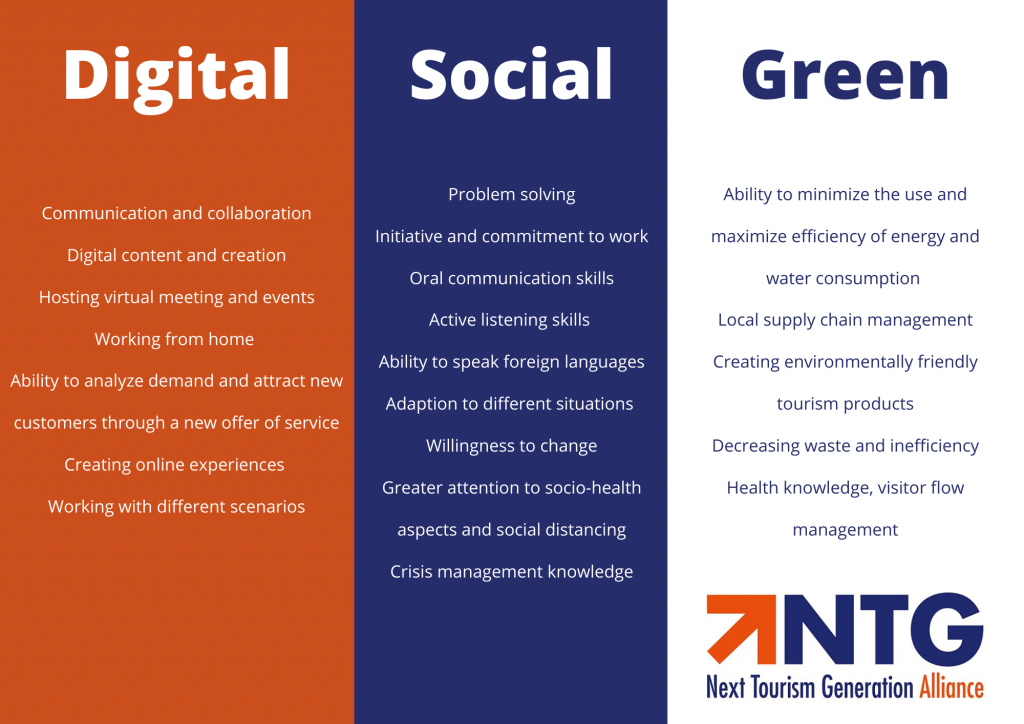Challenges and the importance of skills in tourism sub-sectors during and after Covid-19
In this two series blog, the Next Tourism Generation (NTG) Consortium present the communication of Impact of Covid-19 on skills development and employability in the tourism sector in terms of challenges related to skills development, how such challenges may change and what the impacts may be on tourism sub-sectors during and after the crisis. In this blog, NTG focuses on the importance of the development of skills and potential impacts on the sub-sectors during and after the Covid-19 crisis.
Covid-19 has had a major impact on the tourism and hospitality industry in Europe. NTG, therefore, consulted Consortium partners on the impact of Covid-19 on digital, green and social skills development and employability skills, including the challenges that the sub-sectors in tourism and hospitality are facing.
Attractiveness of tourism and hospitality education and an industry career
In tourism education, the biggest challenge is to persuade students not to neglect the importance of tourism education. Many students may prefer to change their future career pathway because of the high risk and additional regulations in the hospitality and tourism industries. Another dilemma is how students can get practical work experience e.g. internships at tourism and hospitality companies if there are restrictions that make it almost impossible to work at the location itself?
However, the Covid-19 situation also leads to the fact that businesses have to let go of their comfort zone, this is the time to upskill the digital skills of staff. For example, by providing training on the right digital tools and programs that can make their work more efficient once tourists and visitors are allowed to return to the tourist sites, accommodations and visitor attractions. Nevertheless, it is also a big challenge for businesses in these uncertain times to keep talented staff in-house.
Challenges and opportunities for sub-sectors in tourism and hospitality
The Next Tourism Generation Alliance focuses on five sub-sectors in tourism and hospitality and the Consortium gave their views on how the Covid-19 crisis has impacted on each of these sectors.
Destination management organizations (DMOs)
Due to visitor attractions being closed, residents are longing for nature-based activities resulting in a high peak in visitors in nature such as hiking trails. However, destinations that featured overtourism such as Barcelona and Venice are currently seeing the positive outcomes of the minimization of tourist arrivals: dolphins in the waters of Venice and crystal-clear waters. Therefore, DMOs are currently being forced to think about rebuilding their destinations for post-Covid-19 times. Visitor management has always been a relevant and important skill for employers and employees in DMOs, but knowledge and experience of such strategies are becoming crucial in these times.
Accommodation
This sub-sector is facing a major challenge: opening hotels again requires effective communication between employers, employees and customers to ensure staff and guests follow the hygienic-sanitary rules and recommendations to help gain the confidence of customers. However, for many destinations in Europe, it is not clear yet when and how different types of accommodation providers will open again, resulting in a cut in personnel or a rise in part-time employees instead of employees being able to work full-time.
Visitor attractions
Currently, visitor attraction organizations are trying to find solutions on how to implement the social distancing regulations in their attraction sites, a very challenging task which requires flexibility. Furthermore, communication between staff and visitors also needs to be done in an excellent way in order to maintain the social distancing rules. Therefore, communication skills will be crucial in the upcoming months.
F&B operations
The workers in the accommodation and food services sector that have the lowest annual earnings and the lowest levels of education of all sectors indicate the way in which the pandemic may serve to reinforce already substantial disparities in income. Indirectly, the pandemic shines a light on social welfare and job security in tourism, with differences in service employment models underlining vulnerabilities. In Italy, restaurants can prepare takeaway food and on June 1st, the reopening is foreseen but the reorganization of the spaces hypothesized by government measures imposes structural limits that will reduce capacity and number of places opening.
Tour operators and travel agencies
The biggest task that Tour Operators and Travel Agencies are currently coping with are the cancellations of bookings, postponing travel and the forecast for traveling. Yield management will be of crucial importance whereas it is yet unclear how organizations will have to deal with social distancing, matching with the health restrictions with the required general occupancy rate to continue business as usual. A major transformation is awaiting for example in travel arrangements, reorganization and the change in the market. New circumstances will appear and require flexibility from organizations in order to grasp new opportunities and to survive in a new economy with new demands from new types of customers.
Required skills needed in times of Covid-19
The NTG Skills Matrix has identified digital, social and green skills which are of importance for various occupational levels in the sub-sectors. Regarding Covid-19, the Consortium has had a look at the most relevant and required skills needs in times of Covid-19 and the after-phase.
Read blog 2: Skills sets in education and the tourism and hospitality industry in corona times
Follow the efforts of the Next Tourism Generation via our website, Facebook, Twitter | #NTGskillsalliance or via LinkedIn





No Comments